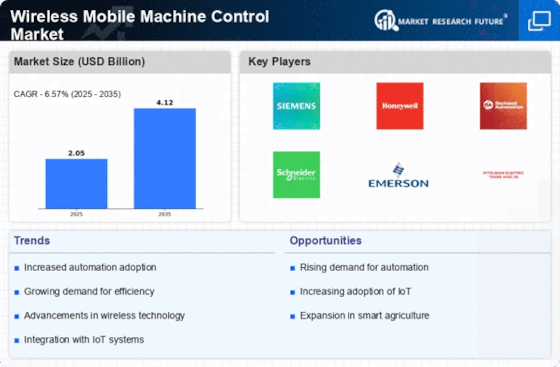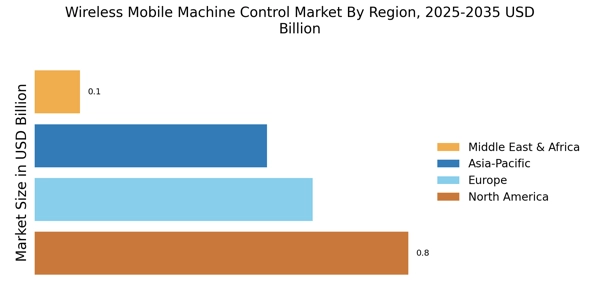Expansion of Smart Agriculture Practices
The Wireless Mobile Machine Control Market is significantly influenced by the expansion of smart agriculture practices. Farmers are increasingly adopting precision farming techniques that utilize wireless mobile machine control technologies to optimize crop yields and resource management. The market for smart agriculture is projected to reach several billion dollars in the next few years, driven by the need for sustainable farming solutions. Wireless mobile machine control systems enable farmers to monitor and control machinery remotely, leading to improved efficiency and reduced operational costs. This trend is likely to propel the growth of the wireless mobile machine control market.
Rising Demand for Automation in Industries
The Wireless Mobile Machine Control Market is witnessing a notable increase in the demand for automation across various sectors. Industries such as manufacturing, agriculture, and logistics are increasingly adopting automated solutions to enhance productivity and reduce labor costs. Reports indicate that the automation market is expected to grow at a compound annual growth rate of over 10% in the coming years. This trend is pushing companies to invest in wireless mobile machine control technologies that facilitate seamless operation and monitoring of machinery. As automation becomes a priority, the market for wireless mobile machine control is likely to expand significantly.
Emphasis on Safety and Compliance Standards
In the Wireless Mobile Machine Control Market, there is a growing emphasis on safety and compliance standards. Regulatory bodies are implementing stricter guidelines to ensure the safe operation of machinery, particularly in high-risk environments. This focus on safety is driving manufacturers to develop wireless mobile machine control solutions that not only comply with regulations but also enhance operational safety. Data suggests that companies investing in safety-compliant technologies can reduce workplace accidents by up to 40%. As safety becomes a critical concern, the demand for compliant wireless mobile machine control systems is expected to increase.
Technological Innovations in Wireless Communication
The Wireless Mobile Machine Control Market is experiencing a surge in technological innovations, particularly in wireless communication technologies. Advancements such as 5G and IoT are enhancing connectivity and enabling real-time data transmission. This evolution allows for more efficient machine control, reducing latency and improving operational efficiency. According to recent data, the integration of these technologies is projected to increase productivity by up to 30% in various sectors, including construction and agriculture. As companies seek to leverage these advancements, the demand for sophisticated wireless mobile machine control solutions is likely to rise, driving market growth.
Integration of Artificial Intelligence in Machine Control
The integration of artificial intelligence (AI) in the Wireless Mobile Machine Control Market is transforming how machinery is operated and managed. AI technologies are being utilized to analyze data from various sources, enabling predictive maintenance and enhancing decision-making processes. This integration is expected to improve operational efficiency and reduce downtime, which is crucial for industries relying on continuous machine operation. Market analysis indicates that the AI in machine control segment is anticipated to grow substantially, with investments in AI technologies increasing. As industries recognize the benefits of AI, the demand for wireless mobile machine control solutions is likely to rise.

















